 To my mind, the mark of a good First Aider is the same as that of a triage nurse. You prioritize according to the severity, or potential danger, of each situation.
To my mind, the mark of a good First Aider is the same as that of a triage nurse. You prioritize according to the severity, or potential danger, of each situation.
Panicking people fit into the latter category. But they had already calmed somewhat just by me turning up and taking control. I often joke that 90% of First Aid is crowd control, but it's all too often true.
The best way of doing that is to give people things to do. I sent the man to stand at the kerb and watch out for the ambulance. His job was to wave them towards the scene. He was perfectly calm once he was doing that.
I asked the woman to ensure that the gathering group of neighbors and passers-by didn't crowd us. She was great.
I was sitting with the boy, ensuring that he remained stationary, when his father arrived. I didn't want the boy to move, just in case there were spinal injuries that I couldn't see. He'd said that he had banged his head when he fell, but I couldn't feel any bumps.
Once Dad was there, my priority immediately switched to his asthma attack. His son had taken one look at him and apprised me of that condition! I reassured Dad that his son was fine, and tried to direct him to a nearby low wall, where we could sit down.
I'd just ascertained that he didn't have his medication on him, when the paramedics pulled up. I relayed to them his situation. One paramedic took over there, while I explained the secondary situation to the second paramedic.
When she walked over to the boy, I returned to my car and left. Job done.


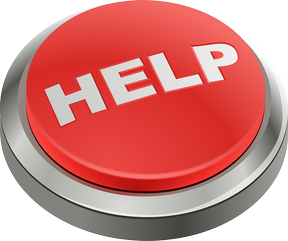 I've been a qualified First Aider since the mid-90s. For a few years there in the noughties, I was the head First Aider for an entire University campus.
I've been a qualified First Aider since the mid-90s. For a few years there in the noughties, I was the head First Aider for an entire University campus.







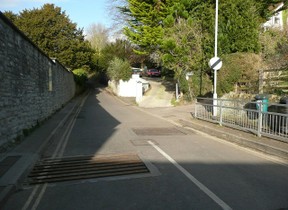 The cattle grid in the foreground of the picture is precisely where this incident occurred. The photographer is standing on a T-junction.
The cattle grid in the foreground of the picture is precisely where this incident occurred. The photographer is standing on a T-junction.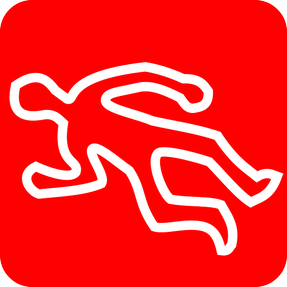 There's panic, and there's hysteria. The couple at the side of the road were exhibiting the latter. I was driving along, paused at traffic lights, and even I could tell that!
There's panic, and there's hysteria. The couple at the side of the road were exhibiting the latter. I was driving along, paused at traffic lights, and even I could tell that! To my mind, the mark of a good First Aider is the same as that of a triage nurse. You prioritize according to the severity, or potential danger, of each situation.
To my mind, the mark of a good First Aider is the same as that of a triage nurse. You prioritize according to the severity, or potential danger, of each situation.


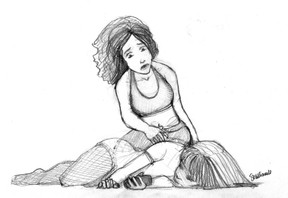 The entire city was in gridlock. Like most British conurbations, it wasn't built with cars in mind. It was all sheep tracks at first, before the Industrial Revolution brought railways and canals. Automobiles were a last century after-thought.
The entire city was in gridlock. Like most British conurbations, it wasn't built with cars in mind. It was all sheep tracks at first, before the Industrial Revolution brought railways and canals. Automobiles were a last century after-thought.


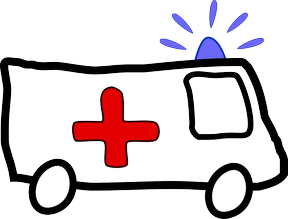 A First Aider is not a paramedic. Nor are we police officers, fire crew, nurses, doctors or any of those other heroes of the hour.
A First Aider is not a paramedic. Nor are we police officers, fire crew, nurses, doctors or any of those other heroes of the hour.


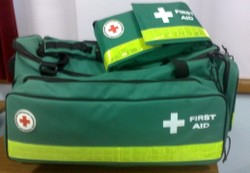

 St Tydecho's Churches in West Waleson 09/03/2014
St Tydecho's Churches in West Waleson 09/03/2014
 Goodies for an Outlander Premiere Partyon 03/06/2015
Goodies for an Outlander Premiere Partyon 03/06/2015
 Holocaust Memorial Day Interview with Rainer Höss, Grandson of Rudolf Architect of Auschwitzon 01/24/2015
Holocaust Memorial Day Interview with Rainer Höss, Grandson of Rudolf Architect of Auschwitzon 01/24/2015
 Romantic Valentine Gifts for an Outlander Fanon 01/16/2015
Romantic Valentine Gifts for an Outlander Fanon 01/16/2015

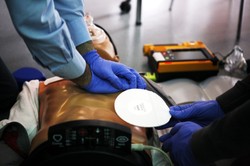
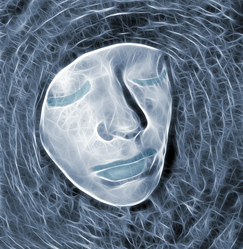
Comments
I'm very glad that you liked it. <3
Thank you so much. With two little kids around, I am worried most of the time. Great article!
You are very welcome, and I do hope that you get the learning that you and those around you deserve. :)
Respect for all of your training! That's way above and beyond anything that I learned. It does stay with you though, doesn't it?
I was speaking with friends last night (including another First Aider) and we were saying that remaining calm is half of the battle. Once you do that, then the rest can be instinctual anyway. Of course, it's easier to remain calm, if you believe that you have the knowledge to deal with the situation.
Thanks for your insight.
I was a lifeguard for four years during university and just after graduating. We learnt first aid through that and then the military gave us our qualifications too. I haven't kept up with them but I still know what I'd do in an emergency. I've seen broken pelvises, people place armband on their feet in a swimming pool (yes, really!) and people collapsing from exhaustion. It's so important to stay calm and collected during those moments. Even with the training, if you let the surprise and shock get to you, you're not going to be much help!
Dustytoes - I've put a strong emphasis above on dealing with strangers in public places. But First Aid moments can just as easily turn up in private, when there's no-one else to handle this stuff. If I'm there, then I promise I will always run to the aid of you and yours. But can you trust that I'll be there, or anyone else with this knowledge?
I naturally agree that more of us should learn!
WriterArtist - Once you understand the basics of how blood pumps around the body, then you can stem most bleeds quite quickly. Fear largely comes from not knowing what to do at the sight of it, plus the fact that blood so often means bad things. But it's amazing how quickly you can become matter of fact about it, when you have a checklist in your head about how to deal with it. Being ready with First Aid means that I never have to worry about it.
Mira - In twenty years, I've only ever seen bones protruding once. That might mean that I'm incredibly lucky, or it might mean that those kind of fractures are more uncommon than we think. I'm glad that I've prompted you to think about learning First Aid.
I admit that I am like the majority of people - I look for someone else to handle this stuff. We are lucky there are people like you around. And yes, more of us should learn, and be able to step up.
I tend to get scared seeing an open wound and blood oozing from the injury. However; I agree with you - we must all be ready with first aid.